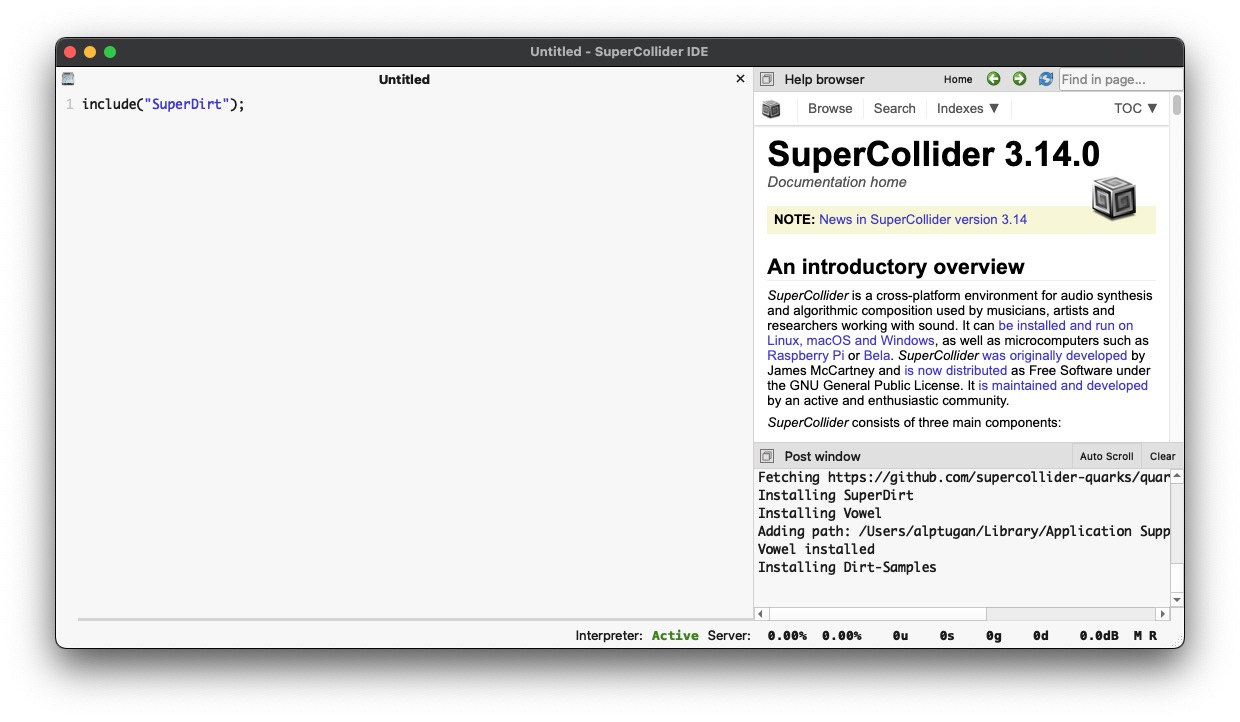1. Install Haskell via GHCup
Goto GHCup and run the installation script on Terminal. Choose default options for the instructions during the installation.
After the installation done, type;
source ~/.zshrc
# Check for the installation
ghcup
# Hold and press Ktrl + D to return back to Shell2. Install Tidalcycles packages
cabal update
cabal v1-install tidal3. Install Supercollider App
Goto SuperCollider and download/install.
Then download sc3-plugins and follow the steps below to setup plugins correctly on your system.
- Unzip the sc3-plugins folder.
- Move the
SC3Pluginsfolder to/Users/<username>/Library/Application Support/SuperCollider/Extensions/SC3pluginsas it is.
4. Install SuperDirt via Supercollider
Open Supercollider app and type include("SuperDirt"); on text editor. Hit ⌘ + R to install the packages.

5. Startup File Configuration
Refer to the documentation to start up Tidalcycles server on Supercollider.
/*
This is an example startup file. You can load it from your startup file
(to be found in Platform.userAppSupportDir +/+ "startup.scd")
*/
(
s.reboot { // server options are only updated on reboot
// configure the sound server: here you could add hardware specific options
// see http://doc.sccode.org/Classes/ServerOptions.html
s.options.numBuffers = 1024 * 256; // increase this if you need to load more samples
s.options.memSize = 8192 * 32; // increase this if you get "alloc failed" messages
s.options.numWireBufs = 64; // increase this if you get "exceeded number of interconnect buffers" messages
s.options.maxNodes = 1024 * 32; // increase this if you are getting drop outs and the message "too many nodes"
s.options.numOutputBusChannels = 2; // set this to your hardware output channel size, if necessary
s.options.numInputBusChannels = 2; // set this to your hardware output channel size, if necessary
// boot the server and start SuperDirt
s.waitForBoot {
~dirt = SuperDirt(2, s); // two output channels, increase if you want to pan across more channels
~dirt.loadSoundFiles; // load samples (path containing a wildcard can be passed in)
// for example: ~dirt.loadSoundFiles("/Users/myUserName/Dirt/samples/*");
// s.sync; // optionally: wait for samples to be read
~dirt.start(57120, 0 ! 12); // start listening on port 57120, create two busses each sending audio to channel 0
// optional, needed for convenient access from sclang:
(
~d1 = ~dirt.orbits[0]; ~d2 = ~dirt.orbits[1]; ~d3 = ~dirt.orbits[2];
~d4 = ~dirt.orbits[3]; ~d5 = ~dirt.orbits[4]; ~d6 = ~dirt.orbits[5];
~d7 = ~dirt.orbits[6]; ~d8 = ~dirt.orbits[7]; ~d9 = ~dirt.orbits[8];
~d10 = ~dirt.orbits[9]; ~d11 = ~dirt.orbits[10]; ~d12 = ~dirt.orbits[11];
);
};
s.latency = 0.3; // increase this if you get "late" messages
};
);